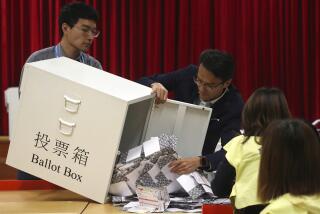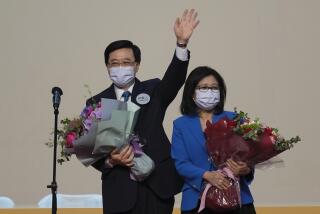Hong Kong Chief Hints at Delay in Democracy
- Share via
HONG KONG — The Beijing-approved leader of Hong Kong appeared to move the goal posts back this week for the territory’s arrival at the full democracy outlined in its mini-constitution.
Departing from the government’s previous assurances that Hong Kong aims to hold direct elections in 10 years, Chief Executive Tung Chee-hwa surprised visiting American democracy monitors by saying the timetable, included in the territory’s Basic Law, might not apply to legislative elections.
In a Tuesday meeting with a delegation from the Washington-based National Democratic Institute for International Affairs led by former U.S. Atty. Gen. Richard L. Thornburgh, Tung reportedly said that the achievement of full democracy could take up to 15 years, depending on how coming elections go.
“We were somewhat puzzled when he indicated it might be 10, 12 or 15 years,” Thornburgh told reporters Wednesday. “He said he was committed to the letter of the Basic Law. . . . But it did seem to contradict the widely shared view that the process of full democracy would be completed within 10 years.”
Constitutional lawyers are poring over the wording of the Basic Law, which mandates a directly elected chief executive by 2007. But though the mini-constitution clearly states that “the ultimate aim is full democracy,” it does not specify timing for a fully elected legislature. The common interpretation has been that direct elections for both would occur together. Tung’s comments Tuesday were the first indication that they may not.
Hong Kong’s 6.6 million people are, on average, among the world’s most prosperous. They can decide where to live and how to invest, and many can speak two or three languages. But Tung says they are not yet ready to choose their own leader or the people who make their laws, and still may not be ready a decade from now.
“Each country is in a different developmental stage, and we must do what is right in the democratic process, taking into account the special circumstances around us,” Tung said after the meeting.
Tung also rebuffed the watchdog group’s wish to observe May 24 Legislative Council elections, the first under Chinese rule.
The elections will be “conducted smoothly and professionally,” Tung told the group, which has observed recent elections in Cambodia and Russia. “There is no need for any overseas authorities to supervise or monitor the electoral process.”
The development of democracy has been a resonant theme in Hong Kong ever since Britain agreed in 1984 to hand the territory back to China. Britain’s last governor, Chris Patten, ignited years of conflict with Beijing when he unilaterally introduced sweeping electoral reforms in 1990 to instill a last-minute taste for democracy before China took over.
When China assumed control of Hong Kong on July 1, the Beijing-backed Hong Kong government’s first act was to undo Patten’s reforms, including dissolving the legislature elected under the liberal system he created.
An appointed parliament quickly passed laws shrinking the number of eligible voters from 2.5 million to 180,000 and switching the election system from a popular vote to proportional representation. The government says the changes will produce a more representative legislature; analysts say they will reduce the number of seats for the democrats and their allies, who swept the last election before the hand-over.
Thornburgh noted that, local politics aside, Hong Kong will have had three different voting systems in three elections, which is likely to confuse voters and hamper participation.
In the May election, 20 of the 60 seats in the legislature will be decided by proportional representation, meaning the top two or three vote-getters in an area will win seats in a particular geographic area. Half the seats will be decided by “functional constituencies,” or voting by corporate blocks. The remaining 10 seats will be elected by an 800-member Election Committee. Some people will be allowed to vote twice, once for their local candidate and once for a representative of their profession.
National Democratic Institute delegates said they will return in May--without official observer status--along with representatives from European and Asian groups to watch Hong Kong’s first elections under its new government.
“Our hope is that Hong Kong is committed to increasing people’s participation,” said delegation member Kamal Hossain, a former foreign minister of Bangladesh. “Elections are about people exercising choice. It’s for them.”
More to Read
Sign up for Essential California
The most important California stories and recommendations in your inbox every morning.
You may occasionally receive promotional content from the Los Angeles Times.










